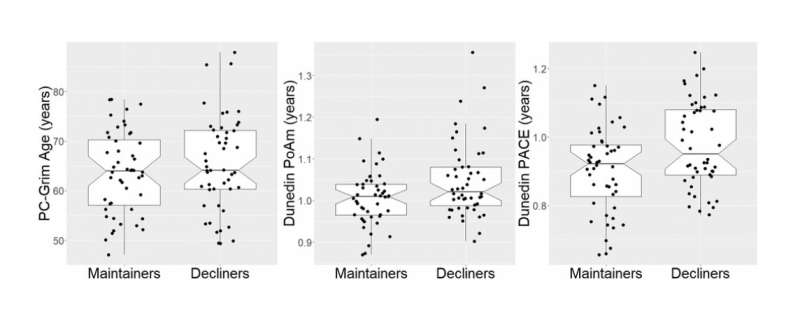Boxplots of significant group effects on PC-GrimAge, dunedin PoAm, and dunedin PACE. Credit: 2022 Reed et al.
DNA methylation-based (DNAm) measures of biological aging associate with increased risk of morbidity and mortality, but their links with cognitive decline are less established.
In this new study published in Aging, researchers Rebecca G. Reed, Judith E. Carroll, Anna L. Marsland, and Stephen B. Manuck from the University of Pittsburgh and the University of California examined changes over a 16-year interval in epigenetic clocks (the traditional and principal components [PC]-based Horvath, Hannum, PhenoAge, GrimAge) and pace of aging measures (Dunedin PoAm, Dunedin PACE) in 48 midlife adults enrolled in the longitudinal arm of the Adult Health and Behavior project (56% Female, baseline AgeM = 44.7 years), selected for discrepant cognitive trajectories.
"We hypothesized that overall, cognitive Decliners would be biologically older compared to cognitive Maintainers," stated the researchers.
Cognitive Decliners (N = 24) were selected based on declines in a composite score derived from neuropsychological tests and matched with participants who did not show any decline, Maintainers (N = 24). Multilevel models with repeated DNAm measures within person tested the main effects of time, group, and group by time interactions. DNAm measures significantly increased over time generally consistent with elapsed time between study visits.
There were also group differences: overall, Cognitive Decliners had an older PC-GrimAge and faster pace of aging (Dunedin PoAm, Dunedin PACE) than Cognitive Maintainers. There were no significant group by time interactions, suggesting accelerated epigenetic aging in Decliners remained constant over time. Older PC-GrimAge and faster pace of aging may be particularly sensitive to cognitive decline in midlife.
"In conclusion, these preliminary results suggest PC-GrimAge and DNAm based pace of aging measures (Dunedin PoAm and PACE) associate with 16-year, neuropsychologically-validated cognitive decline in midlife. The results warrant a larger-scale study to better examine longitudinal associations between changes in DNAm measures and changes across multiple cognitive domains. Ultimately, establishing DNAm measures as biomarkers of cognitive function in midlife may offer pre-clinical markers of a molecular aging mechanism that can help identify individuals at increased risk for cognitive impairment and dementia in later life," the researchers wrote.
More information: Rebecca G. Reed et al, DNA methylation-based measures of biological aging and cognitive decline over 16-years: preliminary longitudinal findings in midlife, Aging (2022). DOI: 10.18632/aging.204376
Provided by Impact Journals LLC
























